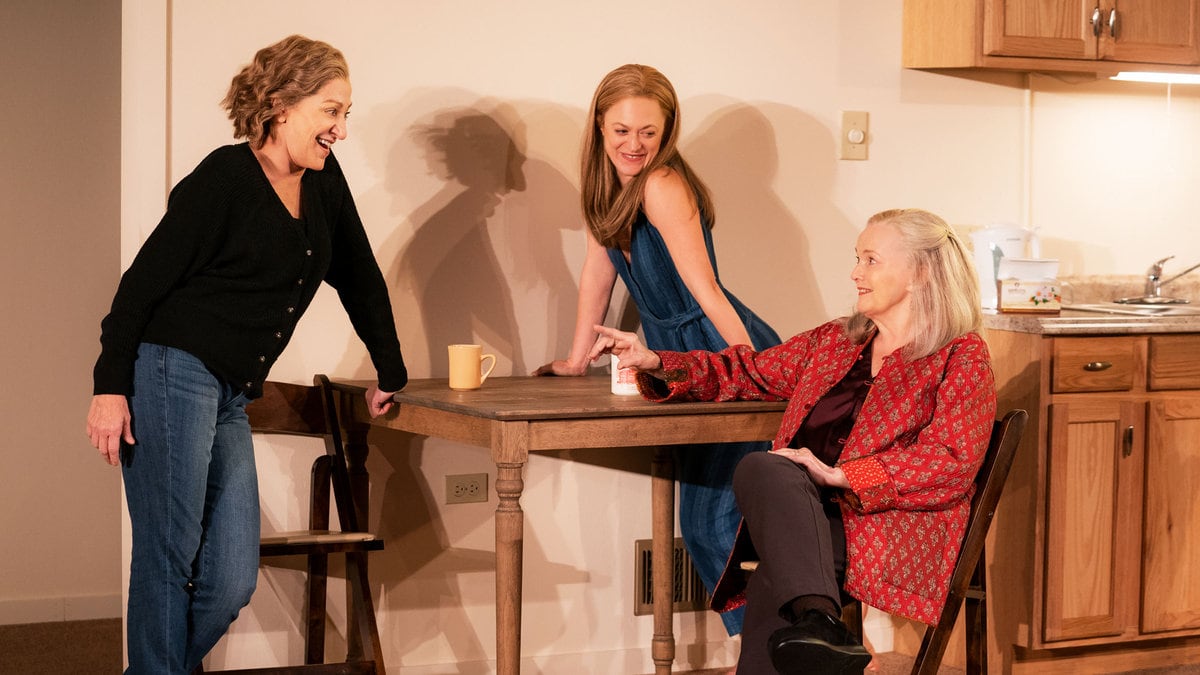On one level, the wonderful Blair Brown, Edie Falco, and Marin Ireland play grandmother Claudette, daughter Charley, and grand-daughter Tessa in Simon Stephens’ delicately affecting play Morning Sun, produced by Manhattan Theatre Club, which opened Nov. 3 at City Center.
But that is a deceptively neat description of what unfolds over around 90 minutes, in which the actors and their characters—they are in their seventies, fifties and thirties, respectively—become unfixed, as they tell the stories of all three women’s lives, jumping around in time as much as between a panoply of humans. Brown, for example, plays Falco’s eventual, very lovely partner, while Ireland also plays Falco’s earlier abusive partner. The play can be quite weird to follow; a moving scene between mother and daughter suddenly becomes an intimate scene featuring amorous sweet nothings or menacing threats.
To underline how un-literally we should see them, in the program these characters are listed as 2 (Brown), 1 (Falco), and 3 (Ireland).
The staging has a whiff of Dana H.’s flat-plane literal weirdness. Dots’ design plonks us in what looks like a basement, with a cheap sink, scattered furnishings, and a wardrobe to the side. It feels wan, a stage for imaginings rather than something more conventional; and that is how—in their game of character switches—the three actors use it, leaving director Lila Neugebauer with the complex task of trying to enliven a deliberately dull stage. The saving grace here, indeed the transfixing heart of the play, are the three beautifully modulated performances.
Instead of an announcement telling us to shut up and shut off our phones, Ireland tells us to hush. The play begins in darkness, with what sounds like a disjointed nightmare. Then we hear how Brown, as the grandmother, managed to get a gorgeous West Village apartment (a rent-controlled, 5th-floor walk-up) back when such magical events were not uncommon. Oh, the sighing in our audience when we heard “Two bedrooms, 75 dollars a month.” New Yorkers of a certain age might relish such a tale, but given market forces now these stories are daggers for so many others.
The apartment sounds idyllic, but the space we are very much isn’t. It feels like an out-of-time purgatory maybe; all the main characters eventually tell each other, and us, how they died. In some sense, they are making theater themselves for each other. They are finally telling each other things they never did when they were alive. In death, in this space between life and death, comes candor.
The three women are creating the stories of their lives, and the fact they play multiple characters adds to the meta-feel of the exercise. This makes for some sharp lyricism and surreal moments, but not necessarily full-blooded theater. The characters, in their not-life, not-death, dreary non-space, feel a little too stuck as they analyze and recall the past. It is down to Brown, Falco, and Ireland’s sterling efforts to engage and spark off each other that we listen and lean in.
The unseen and pretty major character is New York itself, and the best of Stephens’ writing treats the roiling metropolis—its streets, its hotspots, the way a morning of bright sunlight can make 7th Avenue into a shimmering urban runway—with the precision and passion that all dedicated New Yorkers embrace their city with. It’s a pride, possessiveness, and a singular, all-consuming, forever challenging love affair, and we wouldn’t have it any other way. The stage may be dull, but we can absolutely see the colors, shapes, and characters of Manhattan as summoned up by Brown, Falco, and Ireland.

Blair Brown (standing) holds Edie Falco in "Morning Sun"
Matthew MurphyBrown has the canny, wry wisdom of a New Yorker who has seen it all, and Falco is the similarly wry but way snappier daughter who grew up in the crook of the arm of the 1960s, yet found it boring. Her best friend is a girl then a woman named Casey, played by Ireland. They cause merry hell with each other, and then their friendship falls apart. This is an oddly jarring moment, as nothing in Casey’s free-and-easy attitude would suggest the reason the friendship eventually disintegrates, but what Stephens does get right is the strangeness of life’s particular pivot moments, such as the last time one sees someone they have known and loved for so long.
A secretary at St. Vincent’s, Charley watches AIDS devastate loved ones and the community around her. 9/11 provides further sorrow, and then there are the secrets and lies around illness, bad relationships, mental illness, familial responsibility, and desire that bubble between the women. Morning Sun is mostly a very serious play, and so its moments of offhandedness and zinger wit are much appreciated. Just wait for the delicious profanity when Falco’s long-dumped abusive partner appears back on the scene, keen to try and scam his way to creaming off some profits for the suggested sale of the West Village apartment.
The dazzling Ireland executes the most dramatic character shifts—a true, funny, scary, masterful chameleon at work. While the performances are perfect, the script can drag, circling some wagons to fill out time rather than depth and understanding. It’s odd that suddenly Ireland’s grand-daughter is depressed and angry out of nowhere, for example. But then the final sequences click into gear, and Charley is given a beautiful raging-against-the-dying-of-the-light speech, which again encapsulates just as much about New York City as it does about her, her embrace of life, her fear of death, and her love for Tessa.
It is notable that the most beautiful lighting in the play (by Lap Chi Chu) evokes the morning sun of the play’s title. It streams in from stage right, a bright, lovely, bathing orb of light. Again, we remember that really these women are all dead, and yet alive in front of us telling their stories, and in those shaded borderlines of memory, joy, sadness, toughness, and togetherness is a bigger story of a city and how a city holds its own histories—so many histories.
Of course, the truly happy ending happens offstage, and whoever ended up with that damn apartment.







